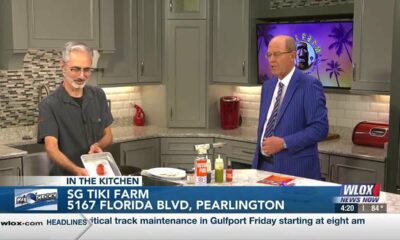Kaiser Health News
Feds Hope to Cut Sepsis Deaths by Hitching Medicare Payments to Treatment Stats
Julie Appleby, KFF Health News
Wed, 11 Oct 2023 09:00:00 +0000
Don Smith remembers the moment he awoke in an intensive care unit after 13 days in a medically induced coma. His wife and daughter were at his bedside, and he thought it had been only a day since he arrived at the emergency room with foot pain.
Smith said his wife “slowly started filling me in” on the surgery, the coma, the ventilator. The throbbing in his foot had been a signal of a raging problem.
“When you hear someone say a person died of infection, that's sepsis,” said Smith, 66, of Colorado Springs, Colorado, who went to the ER shortly before Christmas 2017. Ultimately, he spent almost two months in the hospital and a rehab center following multiple surgeries to clear the infected tissue and, later, to remove seven toes.
Sepsis, the body's extreme response to an infection, affects 1.7 million adults in the United States annually. It stems from fungal, viral, or bacterial infections, similar to what struck Madonna this year, although the singer never said whether she was diagnosed with sepsis. Treatment delays of even a few hours can undermine a patient's chance of survival. Yet sepsis can be difficult to diagnose because some patients don't present with common symptoms like fever, rapid heart rate, or confusion.
A Biden administration rule, finalized in August, ups the ante for hospitals, setting specific treatment metrics that must be met for all patients with suspected sepsis, which could help save some of the 350,000 adults who die of infections annually. Children, too, are affected, with some estimates that 75,000 are treated each year for sepsis and up to 20% of them die. Hospitals that fail to meet the requirements risk losing potentially millions in Medicare reimbursement for the year.
Still, because the rule applies broadly, it has triggered pushback for its lack of flexibility.
Efforts to reduce sepsis deaths are welcome, but “where it gets controversial becomes ‘Is this the best way to do it?'” said Chanu Rhee, an infectious disease physician and associate professor of population medicine at Harvard Medical School.
The approach requires that blood tests be done quickly to look for markers that may indicate sepsis. Also, the measures say antibiotics must be started within three hours of identifying a possible case. The quality measures, called the Severe Sepsis/Septic Shock Early Management Bundle, also call for certain other tests and intravenous fluids to keep blood pressure from dropping dangerously low.
In the proposed rule, which was issued in May, Medicare regulators wrote that the treatments have resulted in “significant reductions in hospital length of stay, re-admission rates and mortality,” since the guidelines were initiated in 2015 under a requirement that hospitals simply report whether they were following them or not.
“These are core things that everyone should do every time they see a septic patient,” said Steven Simpson, a critical-care physician, a professor of medicine at the University of Kansas, and the chairman of the Sepsis Alliance, an advocacy group backed by individual, government, and health industry funding.
The final rule builds on that earlier effort. Nationwide, an average of 57% of patients received care that met the guidelines in 2021, with the most compliant averaging 80%, according to the Biden administration.
But, starting in fall 2024, hospitals must move beyond simply reporting on the measures and meet the specific treatment benchmarks, which will be added to Medicare's Hospital Value-Based Purchasing Program.
“Before, even if you were reporting 0% compliance, you didn't lose your money. Now you actually have to do it,” said Simpson.
Failing to meet those measures and other patient-safety standards could be costly: Smaller hospitals could lose “hundreds of thousands” of dollars in Medicare reimbursements annually; for large institutions, “it's in the millions-of-dollars range,” said Akin Demehin, senior director of quality and patient safety policy at the American Hospital Association.
The hospital association opposed the final rule, writing in a June letter to the Centers for Medicare & Medicaid Services that the recommended treatments had not kept up with evolving science and that their focus on quick antibiotic administration for all suspected cases “has the high potential to lead to excessive use.” That could fuel antibiotic resistance.
Similar concerns have been cited by other professional medical associations, including the Infectious Diseases Society of America. In a 2020 paper, it called for modifying the metrics to target only patients with septic shock, the most serious form of the condition, rather than all suspected sepsis cases. The society also argued that physicians need more flexibility.
What's more, there is debate over whether broadly implementing the treatment regimen will save lives.
Rhee raised this issue early this year in JAMA. In an opinion piece he co-authored, Rhee cited four studies, including one he led, showing broad-spectrum antibiotic use increased after the sepsis bundle was introduced eight years ago, yet there was little or no change in outcomes for patients.
“Unfortunately, we do not have good evidence that implementation of the sepsis policy has led to an improvement in sepsis mortality rates,” he said.
Another study offers a different view. It showed that adhering to the treatments reduced deaths by about 5.7% among patients who received them. Medicare officials cited the study and its results in their proposal for the rule.
Rhee is unconvinced that the treatment protocols alone led to the drop.
Simpson, at the Sepsis Alliance, said there is enough evidence that the effort to follow the treatment standard resulted in improvements, and he is looking forward to more.
“It is quite clear that this works better than what was present before, which was nothing,” Simpson said. If the current sepsis mortality rate could be cut “by even 5%, we could save a lot of lives.”
All those involved agree that awareness is crucial, not only on the part of medical teams, but among patients, too. Crystal Waguespack, 41, a nurse in Baton Rouge, Louisiana, said she knew about sepsis but didn't apply that to her own symptoms when she began experiencing severe pain in 2018, two weeks after an operation.
“I never checked to see if I had a fever,” or noticed her increased heart rate, she said.
But she did speak up. Waguespack said the severe pain, which occurred on a weekend when her regular doctor was unavailable, led her to see a physician unfamiliar with her case who told her that the pain was normal and that she was simply anxious. So she went to the emergency department.
“I did not take no for an answer, and I think that saved my life,” she said.
At the hospital, doctors found she had spinal fluid leaking and a surgery-site infection. She spent 14 days in the hospital battling sepsis, meningitis, and a heart infection.
Key takeaways from her experience: Always ask, “Could this be sepsis?” said advocates. And don't wait.
Smith certainly wishes he had gone directly to a hospital instead of first seeing a foot specialist.
“I went to a foot doctor because my foot hurt,” said Smith. “But a foot doctor is not an infectious disease doctor. You need to get to a place where different kinds of doctors can see you. That's called a hospital.”
——————————
By: Julie Appleby, KFF Health News
Title: Feds Hope to Cut Sepsis Deaths by Hitching Medicare Payments to Treatment Stats
Sourced From: kffhealthnews.org/news/article/sepsis-infection-delays-deaths-medicare-payments/
Published Date: Wed, 11 Oct 2023 09:00:00 +0000
Kaiser Health News
Clean Needles Save Lives. In Some States, They Might Not Be Legal.
Ed Mahon, Spotlight PA and Sarah Boden, WESA
Fri, 17 May 2024 09:00:00 +0000
Kim Botteicher hardly thinks of herself as a criminal.
On the main floor of a former Catholic church in Bolivar, Pennsylvania, Botteicher runs a flower shop and cafe.
In the former church's basement, she also operates a nonprofit organization focused on helping people caught up in the drug epidemic get back on their feet.
The nonprofit, FAVOR ~ Western PA, sits in a rural pocket of the Allegheny Mountains east of Pittsburgh. Her organization's home county of Westmoreland has seen roughly 100 or more drug overdose deaths each year for the past several years, the majority involving fentanyl.
Thousands more residents in the region have been touched by the scourge of addiction, which is where Botteicher comes in.
She helps people find housing, jobs, and health care, and works with families by running support groups and explaining that substance use disorder is a disease, not a moral failing.
But she has also talked publicly about how she has made sterile syringes available to people who use drugs.
“When that person comes in the door,” she said, “if they are covered with abscesses because they have been using needles that are dirty, or they've been sharing needles — maybe they've got hep C — we see that as, ‘OK, this is our first step.'”
Studies have identified public health benefits associated with syringe exchange services. The Centers for Disease Control and Prevention says these programs reduce HIV and hepatitis C infections, and that new users of the programs are more likely to enter drug treatment and more likely to stop using drugs than nonparticipants.
This harm-reduction strategy is supported by leading health groups, such as the American Medical Association, the World Health Organization, and the International AIDS Society.
But providing clean syringes could put Botteicher in legal danger. Under Pennsylvania law, it's a misdemeanor to distribute drug paraphernalia. The state's definition includes hypodermic syringes, needles, and other objects used for injecting banned drugs. Pennsylvania is one of 12 states that do not implicitly or explicitly authorize syringe services programs through statute or regulation, according to a 2023 analysis. A few of those states, but not Pennsylvania, either don't have a state drug paraphernalia law or don't include syringes in it.
Those working on the front lines of the opioid epidemic, like Botteicher, say a reexamination of Pennsylvania's law is long overdue.
There's an urgency to the issue as well: Billions of dollars have begun flowing into Pennsylvania and other states from legal settlements with companies over their role in the opioid epidemic, and syringe services are among the eligible interventions that could be supported by that money.
The opioid settlements reached between drug companies and distributors and a coalition of state attorneys general included a list of recommendations for spending the money. Expanding syringe services is listed as one of the core strategies.
But in Pennsylvania, where 5,158 people died from a drug overdose in 2022, the state's drug paraphernalia law stands in the way.
Concerns over Botteicher's work with syringe services recently led Westmoreland County officials to cancel an allocation of $150,000 in opioid settlement funds they had previously approved for her organization. County Commissioner Douglas Chew defended the decision by saying the county “is very risk averse.”
Botteicher said her organization had planned to use the money to hire additional recovery specialists, not on syringes. Supporters of syringe services point to the cancellation of funding as evidence of the need to change state law, especially given the recommendations of settlement documents.
“It's just a huge inconsistency,” said Zoe Soslow, who leads overdose prevention work in Pennsylvania for the public health organization Vital Strategies. “It's causing a lot of confusion.”
Though sterile syringes can be purchased from pharmacies without a prescription, handing out free ones to make drug use safer is generally considered illegal — or at least in a legal gray area — in most of the state. In Pennsylvania's two largest cities, Philadelphia and Pittsburgh, officials have used local health powers to provide legal protection to people who operate syringe services programs.
Even so, in Philadelphia, Mayor Cherelle Parker, who took office in January, has made it clear she opposes using opioid settlement money, or any city funds, to pay for the distribution of clean needles, The Philadelphia Inquirer has reported. Parker's position signals a major shift in that city's approach to the opioid epidemic.
On the other side of the state, opioid settlement funds have had a big effect for Prevention Point Pittsburgh, a harm reduction organization. Allegheny County reported spending or committing $325,000 in settlement money as of the end of last year to support the organization's work with sterile syringes and other supplies for safer drug use.
“It was absolutely incredible to not have to fundraise every single dollar for the supplies that go out,” said Prevention Point's executive director, Aaron Arnold. “It takes a lot of energy. It pulls away from actual delivery of services when you're constantly having to find out, ‘Do we have enough money to even purchase the supplies that we want to distribute?'”
In parts of Pennsylvania that lack these legal protections, people sometimes operate underground syringe programs.
The Pennsylvania law banning drug paraphernalia was never intended to apply to syringe services, according to Scott Burris, director of the Center for Public Health Law Research at Temple University. But there have not been court cases in Pennsylvania to clarify the issue, and the failure of the legislature to act creates a chilling effect, he said.
Carla Sofronski, executive director of the Pennsylvania Harm Reduction Network, said she was not aware of anyone having faced criminal charges for operating syringe services in the state, but she noted the threat hangs over people who do and that they are taking a “great risk.”
In 2016, the CDC flagged three Pennsylvania counties — Cambria, Crawford, and Luzerne — among 220 counties nationwide in an assessment of communities potentially vulnerable to the rapid spread of HIV and to new or continuing high rates of hepatitis C infections among people who inject drugs.
Kate Favata, a resident of Luzerne County, said she started using heroin in her late teens and wouldn't be alive today if it weren't for the support and community she found at a syringe services program in Philadelphia.
“It kind of just made me feel like I was in a safe space. And I don't really know if there was like a come-to-God moment or come-to-Jesus moment,” she said. “I just wanted better.”
Favata is now in long-term recovery and works for a medication-assisted treatment program.
At clinics in Cambria and Somerset Counties, Highlands Health provides free or low-cost medical care. Despite the legal risk, the organization has operated a syringe program for several years, while also testing patients for infectious diseases, distributing overdose reversal medication, and offering recovery options.
Rosalie Danchanko, Highlands Health's executive director, said she hopes opioid settlement money can eventually support her organization.
“Why shouldn't that wealth be spread around for all organizations that are working with people affected by the opioid problem?” she asked.
In February, legislation to legalize syringe services in Pennsylvania was approved by a committee and has moved forward. The administration of Gov. Josh Shapiro, a Democrat, supports the legislation. But it faces an uncertain future in the full legislature, in which Democrats have a narrow majority in the House and Republicans control the Senate.
One of the bill's lead sponsors, state Rep. Jim Struzzi, hasn't always supported syringe services. But the Republican from western Pennsylvania said that since his brother died from a drug overdose in 2014, he has come to better understand the nature of addiction.
In the committee vote, nearly all of Struzzi's Republican colleagues opposed the bill. State Rep. Paul Schemel said authorizing the “very instrumentality of abuse” crossed a line for him and “would be enabling an evil.”
After the vote, Struzzi said he wanted to build more bipartisan support. He noted that some of his own skepticism about the programs eased only after he visited Prevention Point Pittsburgh and saw how workers do more than just hand out syringes. These types of programs connect people to resources — overdose reversal medication, wound care, substance use treatment — that can save lives and lead to recovery.
“A lot of these people are … desperate. They're alone. They're afraid. And these programs bring them into someone who cares,” Struzzi said. “And that, to me, is a step in the right direction.”
At her nonprofit in western Pennsylvania, Botteicher is hoping lawmakers take action.
“If it's something that's going to help someone, then why is it illegal?” she said. “It just doesn't make any sense to me.”
This story was co-reported by WESA Public Radio and Spotlight PA, an independent, nonpartisan, and nonprofit newsroom producing investigative and public-service journalism that holds power to account and drives positive change in Pennsylvania.
KFF Health News is a national newsroom that produces in-depth journalism about health issues and is one of the core operating programs at KFF—an independent source of health policy research, polling, and journalism. Learn more about KFF.
USE OUR CONTENT
This story can be republished for free (details).
——————————
By: Ed Mahon, Spotlight PA and Sarah Boden, WESA
Title: Clean Needles Save Lives. In Some States, They Might Not Be Legal.
Sourced From: kffhealthnews.org/news/article/clean-needles-syringe-services-programs-legal-gray-area-risk-pennsylvania/
Published Date: Fri, 17 May 2024 09:00:00 +0000
Kaiser Health News
Watch: John Oliver Dishes on KFF Health News’ Opioid Settlements Series
Fri, 17 May 2024 09:00:00 +0000
Opioid manufacturers, distributors, and retailers are paying tens of billions of dollars in restitution to settle lawsuits related to their role in the nation's overdose epidemic. A recent broadcast of “Last Week Tonight With John Oliver” examined how that money is being spent by state and local governments across the United States.
The segment featured reporting from the KFF Health News series “Payback: Tracking the Opioid Settlement Cash.” You can learn more about the issue and read our collection of articles by Aneri Pattani here.
——————————
Title: Watch: John Oliver Dishes on KFF Health News' Opioid Settlements Series
Sourced From: kffhealthnews.org/news/article/watch-john-oliver-kff-health-news-payback-opioid-settlements-series/
Published Date: Fri, 17 May 2024 09:00:00 +0000
Kaiser Health News
KFF Health News’ ‘What the Health?’: Bird Flu Lands as the Next Public Health Challenge
Thu, 16 May 2024 18:30:00 +0000
The Host
Julie Rovner is chief Washington correspondent and host of KFF Health News' weekly health policy news podcast, “What the Health?” A noted expert on health policy issues, Julie is the author of the critically praised reference book “Health Care Politics and Policy A to Z,” now in its third edition.
Public health officials are watching with concern since a strain of bird flu spread to dairy cows in at least nine states, and to at least one dairy worker. But in the wake of covid-19, many farmers are loath to let in health authorities for testing.
Meanwhile, another large health company — the Catholic hospital chain Ascension — has been targeted by a cyberattack, leading to serious problems at some facilities.
This week's panelists are Julie Rovner of KFF Health News, Rachel Cohrs Zhang of Stat, Alice Miranda Ollstein of Politico, and Sandhya Raman of CQ Roll Call.
Panelists
Rachel Cohrs Zhang
Stat News
Alice Miranda Ollstein
Politico
Sandhya Raman
CQ Roll Call
Among the takeaways from this week's episode:
- Stumbles in the early response to bird flu bear an uncomfortable resemblance to the early days of covid, including the troubles protecting workers who could be exposed to the disease. Notably, the Department of Agriculture benefited from millions in covid relief funds designed to strengthen disease surveillance.
- Congress is working to extend coverage of telehealth care; the question is, how to pay for it? Lawmakers appear to have settled on a two-year agreement, though more on the extension — including how much it will cost — remains unknown.
- Speaking of telehealth, a new report shows about 20% of medication abortions are supervised via telehealth care. State-level restrictions are forcing those in need of abortion care to turn to options farther from home.
- And new reporting on Medicaid illuminates the number of people falling through the cracks of the government health system for low-income and disabled Americans — including how insurance companies benefit from individuals' confusion over whether they have Medicaid coverage at all.
Also this week, Rovner interviews Atul Grover of the Association of American Medical Colleges about its recent analysis showing that graduating medical students are avoiding training in states with abortion bans and major restrictions.
Plus, for “extra credit,” the panelists suggest health policy stories they read this week that they think you should read, too:
Julie Rovner: NPR's “Why Writing by Hand Beats Typing for Thinking and Learning,” by Jonathan Lambert.
Alice Miranda Ollstein: Time's “‘I Don't Have Faith in Doctors Anymore.' Women Say They Were Pressured Into Long-Term Birth Control,” by Alana Semuels.
Rachel Cohrs Zhang: Stat's “After Decades Fighting Big Tobacco, Cliff Douglas Now Leads a Foundation Funded by His Former Adversaries,” by Nicholas Florko.
Sandhya Raman: The Baltimore Banner's “People With Severe Mental Illness Are Stuck in Jail. Montgomery County Is the Epicenter of the Problem,” by Ben Conarck.
Also mentioned on this week's podcast:
- Stat's “My Rendezvous With the Raw Milk Black Market: Quick, Easy, and Unchecked by the FDA,” by Nicholas Florko.
- The Stamford Advocate's “Dan Haar: Hackers Stole a Disabled CT Couple's SNAP Food Aid. Now They're Out $1,373,” by Dan Haar.
- WKRN's “‘Chaos': Nurses, Visitors Describe Conditions Inside Ascension Hospitals After Cyberattack,” by Stephanie Langston.
- KFF Health News' “Medicaid ‘Unwinding' Decried as Biased Against Disabled People,” by Daniel Chang.
- KFF Health News' “Why Medicaid's ‘Undercount' Problem Counts,” by Phil Galewitz.
Credits
Francis Ying
Audio producer
Emmarie Huetteman
Editor
To hear all our podcasts, click here.
And subscribe to KFF Health News' “What the Health?” on Spotify, Apple Podcasts, Pocket Casts, or wherever you listen to podcasts.
——————————
Title: KFF Health News' ‘What the Health?': Bird Flu Lands as the Next Public Health Challenge
Sourced From: kffhealthnews.org/news/podcast/what-the-health-347-bird-flu-next-public-health-challenge-may-16-2024/
Published Date: Thu, 16 May 2024 18:30:00 +0000
-
SuperTalk FM4 days ago
Martin Lawrence making 3 stops in Mississippi on comedy tour
-
Our Mississippi Home3 days ago
Beat the Heat with Mississippi’s Best Waterparks
-
Mississippi Today7 days ago
Lawmakers may have to return to Capitol May 14 to override Gov. Tate Reeves’ potential vetoes
-
Our Mississippi Home4 days ago
Charlie’s U-Pik: Opening Soon for the Summer Season
-
Mississippi News Video6 days ago
Local dentists offer free dental care in Amory
-
Kaiser Health News3 days ago
Medicaid ‘Unwinding’ Decried as Biased Against Disabled People
-
Mississippi News Video2 days ago
Jackson has a gang problem
-
Mississippi News7 days ago
Bond set for West Point couple accused of killing their child




























![HIGH SCHOOL SOFTBALL: Vancleave @ East Central (5/9/2024) [5A Playoffs, South State]](https://www.biloxinewsevents.com/wp-content/uploads/2024/05/1715460379_maxresdefault-80x80.jpg)







